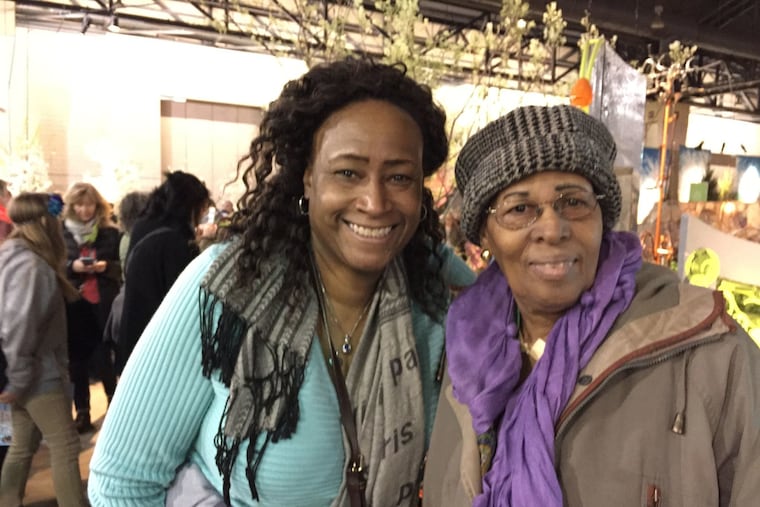Philadelphia retirement home sued over death of woman who fell 15 feet onto sidewalk
The woman's daughters say the facilty failed to keep their mother, who had poor vision and dementia, safe.

The family of a 78-year-old woman with dementia who wandered from a Northwest Philadelphia retirement community and fell to her death sued the facility and its security firm on Wednesday, accusing them of negligence and wrongful death.
According to the suit, filed in Common Pleas Court, Barbara Jones-Davis, who was visually impaired because of glaucoma and had a history of wandering, left Wesley Enhanced Living at Stapeley, also known as Stapeley Hall, in Germantown through a side door on July 8, 2018, at 5:36 p.m. Video surveillance shows her walking alone outside for 23 minutes.
While off camera, she apparently fell from the then-unfenced Stapeley property to a concrete sidewalk along West Washington Lane, 15 feet below. A passerby found her and called 911. Jones-Davis’ skull was fractured and there was bleeding in her brain, in addition to several other broken bones, the suit says. She died of her injuries that night.
The civil suit, filed by Eisenberg, Rothweiler, Winkler, Eisenberg & Jeck, a Philadelphia firm, was brought by Jones-Davis’ daughters, Heather Davis-Stukes, a Philadelphia nurse, and Pamela Davis-Edwards, vice principal of a school in Massachusetts. U.S. Security Associates Inc. of Roswell, Ga., which provides security at the facility, was also named as a defendant. At a news conference at his firm Wednesday, lawyer Daniel Jeck called Jones-Davis’ death “totally preventable.”
While the suit seeks monetary damages, Jeck said his clients’ primary interest was in learning exactly what happened and improving safety at Stapeley.
“No family should have to suffer what our family has suffered,” Davis-Edwards said.
The lawyer for Wesley Enhanced Living did not comment directly, but his firm forwarded a comment from Wesley: “At Wesley Enhanced Living, we are committed to the safety and well-being of our residents and staff. We remain deeply saddened by this resident’s passing, and we have expressed our condolences to her family. Out of respect for the family, and because this is a legal matter, we cannot provide additional details.”
Jay L. Edelstein, who represents U.S. Security, said the company never comments about ongoing litigation.
According to its website, Wesley Enhanced Living at Stapeley is a continuing care retirement community (CCRC) that offers multiple levels of care. Jones-Davis was in personal care, in which people have a degree of independence but need help with some daily activities, such as taking medicine or getting dressed.
Jones-Davis, who had five children, moved unwillingly to Stapeley in August 2017, her daughters said. Her glaucoma was worsening, as was the dementia, which her children first noticed in 2010. They toured Stapeley in 2015, but their mother, who collected bills for Sears, Roebuck & Co. for more than 30 years and then sold fine jewelry at Strawbridge & Clothier, resisted the move from her Olney home. By 2017, they believed she had to have more supervision, because she was wandering near her house and neighbors often had to bring her home.
The sisters said they chose Stapeley, which cost $4,349 a month, because it was beautiful and offered lots of activities. They thought their mother, who had grown increasingly withdrawn, needed more socialization.
Soon after the move, Jones-Davis was found outside the building. There was discussion about moving Jones-Davis to the more-secure memory care section, her daughters said, but they said employees at Stapeley later told them that their mother’s behavior had improved enough after treatment for a urinary tract infection (a condition that can affect cognition) that she could stay in personal care.
The suit mentions other times when Jones-Davis was found wandering inside the facility, and alleges that the staff at Stapeley was aware that she needed supervision. She had not been issued a wander guard, a wrist or ankle band that can trigger door locks or alarms when people with dementia try to leave a facility. Jeck said he believes the door Jones-Davis used would have caused an alarm security officers would have received, but would not have sounded a general alarm that everyone could have heard.
Jeck said that a December 2016 report on Stapeley from the Pennsylvania Department of Health and Human Services noted that three residents had wandered outside. That report would have applied only to the nursing home level of care, a department spokesman said.
The case is similar to one involving a woman with dementia who wandered from a suburban independent-living facility on a frigid night in 2017 and died. Her son’s lawyer, Robert Snyder of King of Prussia, said Shannondell at Valley Forge in Audubon has settled, but the security company, Universal Protection Service LLC, has not. That part of the case is headed for court.